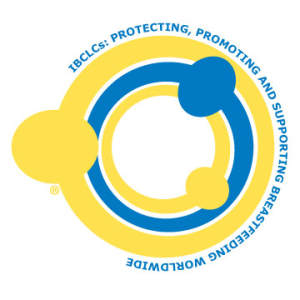I am frequently asked how to become a lactation consultant. The term “lactation consultant” is not trademarked. Since anyone can use the term, it is important to understand the differences in specific trainings and certifications, as the variation is vast. The Massachusetts Breastfeeding Coalition has good information on different credentials. IBCLCs (International Board Certified Lactation Consultants) are the only breastfeeding professionals who specialize in the clinical management of breastfeeding. We adhere to a Code of Professional Conduct and have clearly defined Professional Standards. IBCLCs are recognized throughout the world as possessing the only standardized, board certified lactation credential available.
 Although there are several pathways to becoming an IBCLC, it isn’t an easy process. Like many other careers, it takes years of preparation and thousands of dollars toward initial and continuing education and training. The following link is a good place to start learning about becoming an IBCLC.
Although there are several pathways to becoming an IBCLC, it isn’t an easy process. Like many other careers, it takes years of preparation and thousands of dollars toward initial and continuing education and training. The following link is a good place to start learning about becoming an IBCLC.
There is a huge need for quality breastfeeding support throughout the world. In the United States, local breastfeeding coalitions are an excellent way to learn more about resources in your area. If you live in the Midland, MI area, monthly meetings held by the Midland County Breastfeeding Coalition are an option.
My own journey as a lactation consultant began in college, where my goal was always to work with parents and babies. My social work degree focused on early childhood and youth services. In 2004, after having my second breastfed baby, I discovered La Leche League International. Two years later, I finished the LLLI accreditation process and became a leader through the organization. I started a monthly support group and began providing in-home, phone, and email support to breastfeeding parents. Back then I knew little about the IBCLC credential, but La Leche League became a huge part of my life, not only in my own parenting, but in setting the foundation for what I would eventually choose as a career.
As my children grew older and I volunteered with LLLI more, I began to support parents and babies through some very difficult situations, and I found a huge need for clinical breastfeeding support in our area. Since I love learning and tend to strive for excellence in everything I am passionate about, I desired to increase my clinical knowledge of breastfeeding. After much consideration, I decided becoming an IBCLC was the path I should take. My degree in social work already covered many of the required college courses. After 140+ hours of breastfeeding specific education, 8 years, thousands of hours working with breastfeeding parents, and a summer of full-time studying, I passed the board exam and became an IBCLC. Due to limited resources in my own area, I regularly travel throughout the United States to obtain continuing education and study with other IBCLCs.
Many people believe the fees IBCLCs charge are high and assume they can make a lot of money in choosing this career. However, being an IBCLC, especially in private practice, is very expensive and time consuming. Behind the scenes, there is the high cost of continuing education, recertification, liability insurance, travel, and all the costs of running and owning a business. Many private practice lactation consultants volunteer a lot of hours in their community and spend many hours each week answering “quick” questions and following up with parents. Travel, charting, dealing with insurance companies, writing physician reports, collaborating with other health care providers, and research also occur outside of the actual consultation. Marketing is continually a big part of owning a private practice. I often joke, saying I should have obtained a degree in marketing, which is the least favorite part of my job! But unlike most other health care providers, lactation consultants see the majority of their clients 1-3 times and must continually work to connect with more families.
In short, no one should become an IBCLC expecting to make lots of money, especially in private practice. There is much involved in running a business and providing the assistance new parents need. It takes many years of hard work and commitment, along with a deep passion to improve the health of our communities. Despite all the challenges, I feel it is a privilege to serve families. Being a lactation consultant is worth the sacrifices of time and money my family makes.





Leave A Comment